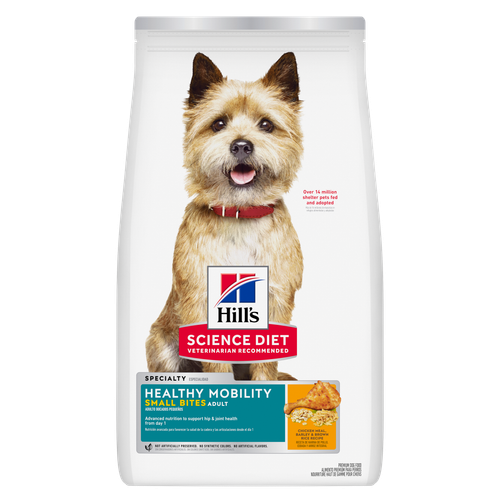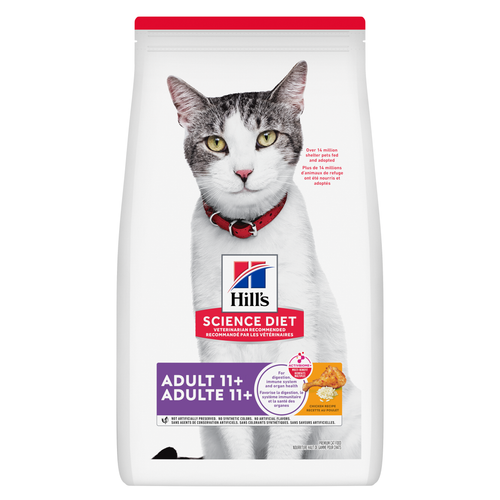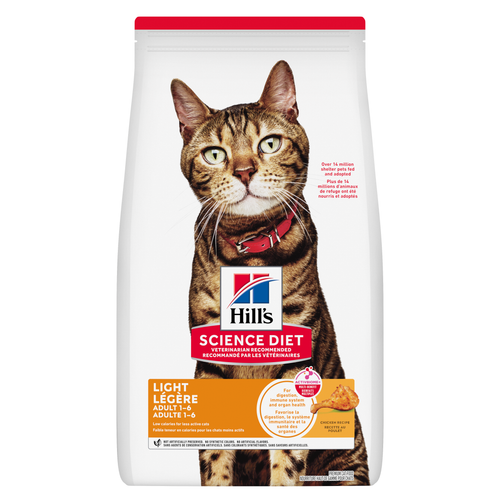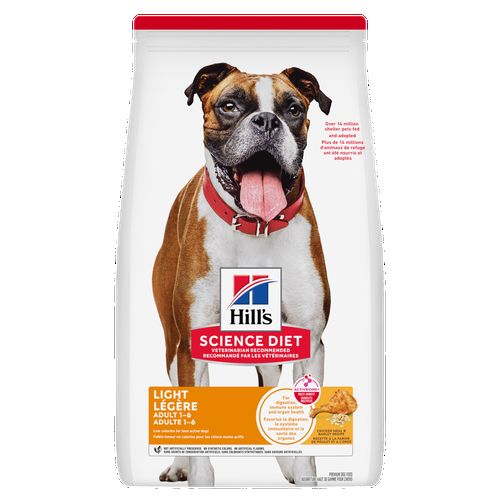
-
Find the right food for your petTake this quiz to see which food may be the best for your furry friend.Find the right food for your petTake this quiz to see which food may be the best for your furry friend.Featured products
 Adult Healthy Mobility Small Bites Chicken Meal, Barley & Brown Rice Recipe Dog Food
Adult Healthy Mobility Small Bites Chicken Meal, Barley & Brown Rice Recipe Dog FoodAdvanced nutrition to support hip & joint health from day 1
Shop Now Adult Sensitive Stomach & Skin Small & Mini Chicken Recipe Dog Food
Adult Sensitive Stomach & Skin Small & Mini Chicken Recipe Dog FoodHill's Science Diet Sensitive Stomach & Skin Small & Mini dry dog food is tailored nutrition for Small & Mini dogs while being gentle on stomachs. Nourishes skin & promotes a lustrous coat.
Shop Now Adult Light Large Breed Chicken Meal & Barley Recipe Dog Food
Adult Light Large Breed Chicken Meal & Barley Recipe Dog Food18% lower calories vs. Science Diet Large Breed Adult
Shop NowFeatured products Adult 11+ Chicken Recipe Cat Food
Adult 11+ Chicken Recipe Cat FoodSupports brain health & beautiful fur. Helps keep immune system, heart & kidneys healthy.
Shop Now Adult Healthy Cuisine Seared Tuna & Carrot Medley Cat Food
Adult Healthy Cuisine Seared Tuna & Carrot Medley Cat FoodDelicious seared tuna paired with tender carrots in a mouthwatering sauce
Shop Now Adult Light Chicken Recipe Cat Food
Adult Light Chicken Recipe Cat Food20% lower calories vs. Hill's Science Diet Adult
Shop Now -
Dog
- Dog Tips & Articles
-
Health Category
- Weight
- Food & Environmental Sensitivities
- Urinary
- Digestive
- Joint
- Kidney
- Dental
- Cancer
-
Life Stage
- Puppy Nutrition
- Adult Nutrition
- Senior Nutrition
Cat- Cat Tips & Articles
-
Health Category
- Weight
- Skin & Food Sensitivities
- Urinary
- Digestive
- Kidney
- Dental
- Stress
- Cancer
-
Life Stage
- Kitten Nutrition
- Adult Nutrition
Featured articles Antioxidants
AntioxidantsUnderstand the importance of antioxidants in your dog or cat's food, and how they can help protect your pet and keep them healthy.
Read More Water
WaterDiscover why water is the most important nutrient for your dog or cat to live a healthy life. Find out how much water your pet should consume each day.
Read More Importance of DHA in your Pet's Food
Importance of DHA in your Pet's FoodLearn about DHA, Docosahexaenoic Acid, a natural omega-3 fatty acid that is essential in the development of the brain and nervous system in cats & dogs.
Read More -


"Your dog has an enlarged prostate." Hearing that from your veterinarian seems odd, right? After all, isn't this a problem that only affects older human men?
While you may have never given this hidden gland a second's thought, an enlarged prostate can take a toll on your dog's health just as it does with human men. Benign prostatic hyperplasia in dogs, often referred to as BPH in dogs, is the most commonly occurring condition to affect a dog's prostate.
Though you may not notice any signs of it, an enlarged prostate occurs in nearly all intact (unneutered) male dogs by the time they turn 6, according to a study published by the Veterinary Clinics of North America: Small Animal Practice.
Cause of Benign Prostatic Hyperplasia
The normal dog prostate has two lobes, one on each side of the urethra, with a small indentation between the lobes. The function of the prostate, making fluid that's secreted into the urethra during the ejaculation of semen, is the same for dogs and humans. This action provides nourishment to the sperm and enhances sperm motility so that it's optimized for fertilization.
A commonly encountered problem is the abnormal growth of the prostate, which can cause unpleasant urinary side effects. The risk for BPH in dogs increases with age and is most common in intact male dogs.
The culprit of this gland's unregulated growth is the major male sex hormone often linked with aggression and dominance: testosterone. Testosterone causes certain types of cells in the prostate to grow in number (a condition referred to as hyperplasia) and to enlarge in size (hypertrophy). Over time, this effect causes the prostate to become enlarged.

Signs of BPH in Dogs
Some dogs with BPH don't show any clinical signs. Others may strain to defecate if their prostate is severely enlarged and presses on their colon. The prostatic enlargement may obstruct the dog's urethra, which can lead to straining during urination.
Flat ribbon-like stools are a suggestive sign of benign prostatic hyperplasia in dogs. Bloody ejaculate or bloody penile discharge after mating are also indicative of the condition, says the American Kennel Club.
Diagnosing Enlarged Prostates in Dogs
Though it does require more diagnostics to confirm the cause, an enlarged prostate in dogs is most commonly found during a rectal exam. An X-ray can also be used to diagnose an enlarged prostate.
An abdominal ultrasound may be recommended, as it can confirm that the internal architecture of the prostate is preserved, even when the gland is enlarged. Urinalysis and urine culture may be performed to rule out a urinary tract infection.
Rarely, a biopsy is needed to distinguish benign prostatic hyperplasia in dogs from other causes of prostatic disease, such as an infection or cancer.


Tasty Tips
How Is BPH in Dogs Treated?
If your dog develops an enlarged prostate and isn't neutered, proceeding with neutering is the treatment of choice for BPH. Approximately one month after the castration procedure, your vet will be able to determine during a rectal exam if your dog's prostate has shrunk. This treatment route avoids extensive diagnostics and can discover if the underlying cause of the prostate growth was, in fact, BPH.
When mild benign prostatic hyperplasia in dogs exists with no signs and the dog is being used for mating, monitoring alone may be chosen. If you have plans to breed your dog, benign prostatic hyperplasia responds very well to medical therapy with finasteride. This medication blocks testosterone's effect on the prostate, and in approximately two to three months, it can trigger a marked reduction in the gland's size.
Keep in mind that if your dog stops taking finasteride, BPH will return. Additionally, you shouldn't handle this drug if you're pregnant or are looking to become pregnant.
Other Causes for an Enlarged Prostate in Dogs
Prostatitis — or inflammation of the prostate — is the second most common cause of an enlarged prostate following BPH, and almost always occurs as a result of an infection.
Prostate cancer is another possible cause of an enlarged prostate. Though neutering eliminates the occurrence of many prostatic diseases, prostate cancer can still occur in neutered dogs. Note: neutering does not increase a dog's risk for malignant prostate disease.
How to Prevent BPH in Dogs
Neutering is the only way to effectively prevent BPH in dogs. There have been anecdotal reports that the supplement saw palmetto can prevent or reverse the effects of an enlarged prostate, but these reports were proven false.
While BPH in dogs can fluctuate, particularly if females in heat are nearby, it's a progressive condition that never resolves on its own. Additionally, antibiotics are ineffective for BPH treatment.
Supporting your dog's immune system with a nutritious food may help prevent prostatic infections that can occur as a result of prostate disease. Antioxidants may assist the prostate in stopping infections along with increasing the health of mucous membranes. Vitamin C is a natural anti-inflammatory and may assist in shrinking the prostate back to its original size.
BPH in dogs can lead to infertility, poor semen quality and infection if untreated. While this condition isn't always easy to spot, pet parents should keep an eye out for any warning signs and consult their vet for treatment options should anything seem amiss.


Dr. Laci Schaible is a small animal veterinarian, veterinary journalist, and a thought leader in the industry. She received her Doctor of Veterinary Medicine from Texas A&M University and her Masters in Legal Studies from Wake Forest University.
Related products

Advanced nutrition to support hip & joint health from day 1

18% lower calories vs. Science Diet Large Breed Adult

Hill's Science Diet Sensitive Stomach & Skin Small & Mini dry dog food is tailored nutrition for Small & Mini dogs while being gentle on stomachs. Nourishes skin & promotes a lustrous coat.

18% lower calories vs. Science Diet Adult
Related articles

Your dog's coat and skin are a big part of your dog's overall health. Ensure you keep your dog's coat healthy, by following these simple tips.

Learn basic steps & precautions for treating a cut on your dog, including what you can put on the cut, and when you should take them to the vet.

Discover how the field of dog science is giving us more and more insights into the inner workings of our furry best friends.

Learn how dogs with sensitive skin can have special dietary needs, how they can develop over time in a healthy dog, and how Hill's dog food can help.

Put your dog on a diet without them knowing
Our low calorie formula helps you control your dog's weight. It's packed with high-quality protein for building lean muscles, and made with purposeful ingredients for a flavorful, nutritious meal. Clinically proven antioxidants, Vitamin C+E, help promote a healthy immune system.
Put your dog on a diet without them knowing
Our low calorie formula helps you control your dog's weight. It's packed with high-quality protein for building lean muscles, and made with purposeful ingredients for a flavorful, nutritious meal. Clinically proven antioxidants, Vitamin C+E, help promote a healthy immune system.

